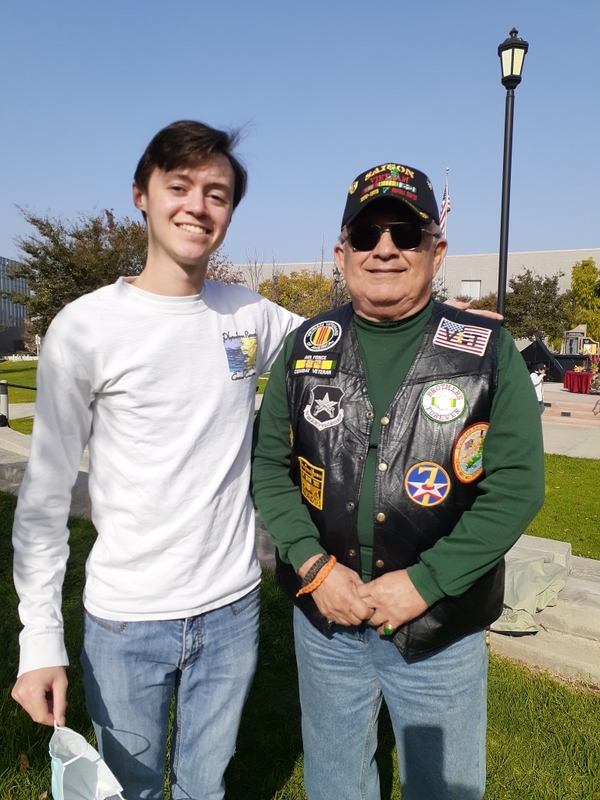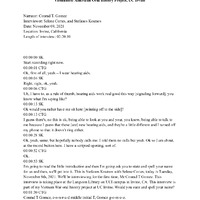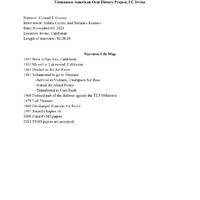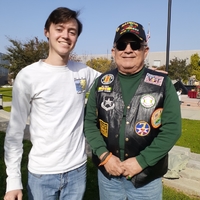A Tet Awakening: A Firsthand Experience of Despair
Within this interview we dove into the life of E-4 Sergeant Conrad T. Gomez, who was born in Santa Ana, CA, on July 21st, 1945. He started by dissecting his Catholic upbringing, his educational background (particularly earning his associates degree in business), being drafted without his knowledge (his mother knew he was drafted so she had him volunteer for the Air Force), and his decision to volunteer to go to Vietnam in 1967. After that he discussed the massive cultural shock he experienced upon his arrival at Cam Ranh Base, and throughout his time there. He then discussed the transition from airman to member of the Allied Police, and how he took on different roles. After that, he discussed leaving Vietnam in 1968, and the difficulties he faced in returning to the United States and reintegrating himself into our society. He finished off by discussing the course of his life after regaining comfort with being in the United States, which included joining a chapter geared towards helping Vietnam veterans (along with his friend from the war) that he eventually became President of, developing his career, and becoming an advocate for those with PTSD (particularly Vietnam veterans).
Keywords
VC: Vietcong, refers to the communist guerilla force of northern Vietnam.
Vietcong: The communist guerilla force of northern Vietnam.
ARVN: Refers to the Army of the Republic of Vietnam.
Hot War: A war with active military hostilities.
Sky Cops: The Air Force security policemen during the Vietnam war.
Audio
https://drive.google.com/file/d/1hY3-gOMiinyMbkDe-SxMwZ9qHabx5lsk/view?usp=drivesdk
In our interview with Mr. Gomez, he explained that his duty was to defend whichever Air force base he was stationed on as a member of the security forces and as a “sky cop.” “Sky cop” was the nickname for service members who were tasked with defending air force bases. This was a very important role, as the security forces on the Air force bases were the only people who were armed and capable of responding to an attack, since the vast majority of the people stationed on the bases were unarmed airmen. No Air force base in Vietnam was ever overrun by the enemy while the “sky cops” were on duty. Our research on this topic has shown us that those who served as “sky cops” often feel that their stories go unheard, and that is exactly why we decided to include this subject in our digital exhibit. Some “sky cops” who served in Vietnam even feel that their fellow service members did not, and still do not recognize their efforts in Vietnam. They talk about how they feel that members of the marines and army undervalue their service, and how the enemy in Vietnam underestimated their abilities. Due to the fact that our narrator was a “sky cop” in Vietnam, and the fact that many “sky cops” who served feel underappreciated, we felt it was necessary for us to include their story into our digital exhibit to bring awareness to their role and efforts in Vietnam. Mr. Gomez served in Vietnam during the Tet Offensive. During our interview he explained his experience during that particular part of the war, and the feelings he had leading up to it. His feelings just before the Tet Offensive began, and the feelings of others involved in the war but in different roles than Mr. Gomez, were of particular interest to us. As an American service member, Mr. Gomez described to us that he felt uneasy, and as if hostilities were brewing in the days leading up to the Tet Offensive. He discussed how he was given extra ammunition and gear, and how he could just feel that something was about to happen. His feelings were correct of course, as the Tet Offensive was one of the largest military operations that took place throughout the course of the Vietnam war. Mr. Gomez’s experience during the build up to the Tet Offensive was typical for an American service member, however, others felt differently during that time. Among those who felt differently were Vietnam civilians. Many Vietnam civilians described feeling positive and excited about the upcoming Tet holiday. Some of them even had a positive experience celebrating the Tet holiday with their families, while American service members like Mr. Gomez had some of their most difficult experiences of the war during that same time. We understand that there are many contrasting experiences and perspectives on the Tet Offensive, so we included this in our digital exhibit to represent those perspectives. Many Vietnam veterans did not receive a very nice homecoming response. Mr. Gomezwas among those who did not, and we discussed that in our interview with him. Mr. Gomez described a couple of negative interactions he had with people when they found out that he is a Vietnam Veteran, and he also described a couple of negative interactions that some of his fellow veterans had. This negative homecoming response that many Vietnam veterans received seems to be quite unique compared to the treatment that American veterans of other wars received upon returning home. For these reasons, this topic was a point of interest for us, and so we decided to include it in our digital exhibit. What we found in our research is that this negative homecoming experience that Vietnam veterans had had a lasting impact on their mental health and well being. Due to this impact, some Vietnam veterans refused to tell anyone that they were veterans of the war for decades. These are effects that many people are not aware of, and we believe it to be well worth it to explain them in our digital exhibit. The airfield at Cam Ranh Bay, opened in 1965 to 1972, was a major military seaport used as A Naval Base to offload supplies, transport indiviuals, be used as a pitstop, etc. It was a reunion point for many of the units assined to the Army, Navy, Marine Corps and Air Force. It was a base that was breaking new ground in the sense that it was the first to base the new F-4C Phantom II tactical fighter-bomber, It was located near the sea which allowed it to be near the Navy carriers at sea, and it allowed the base to flourish into a productive, but very busy base.



